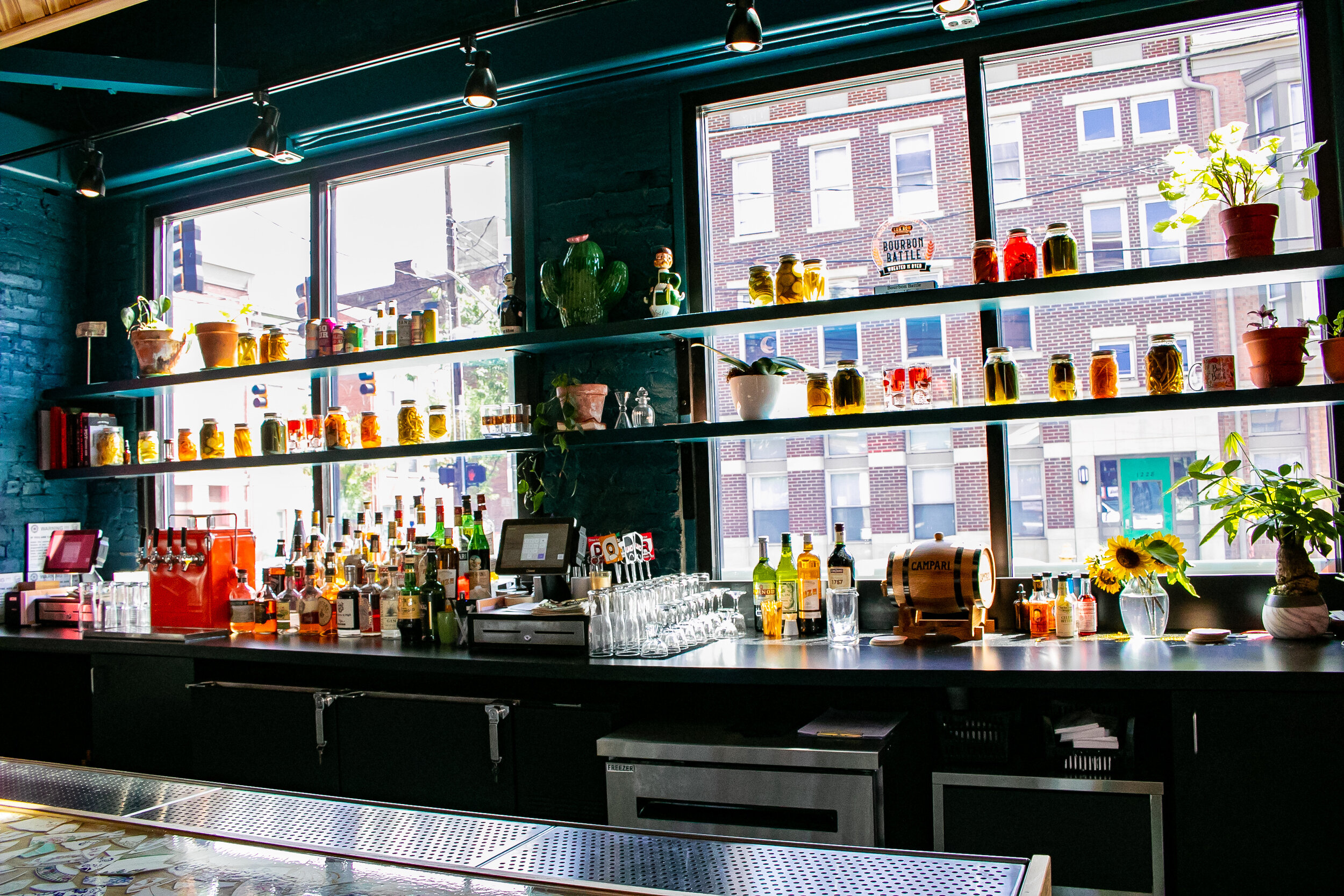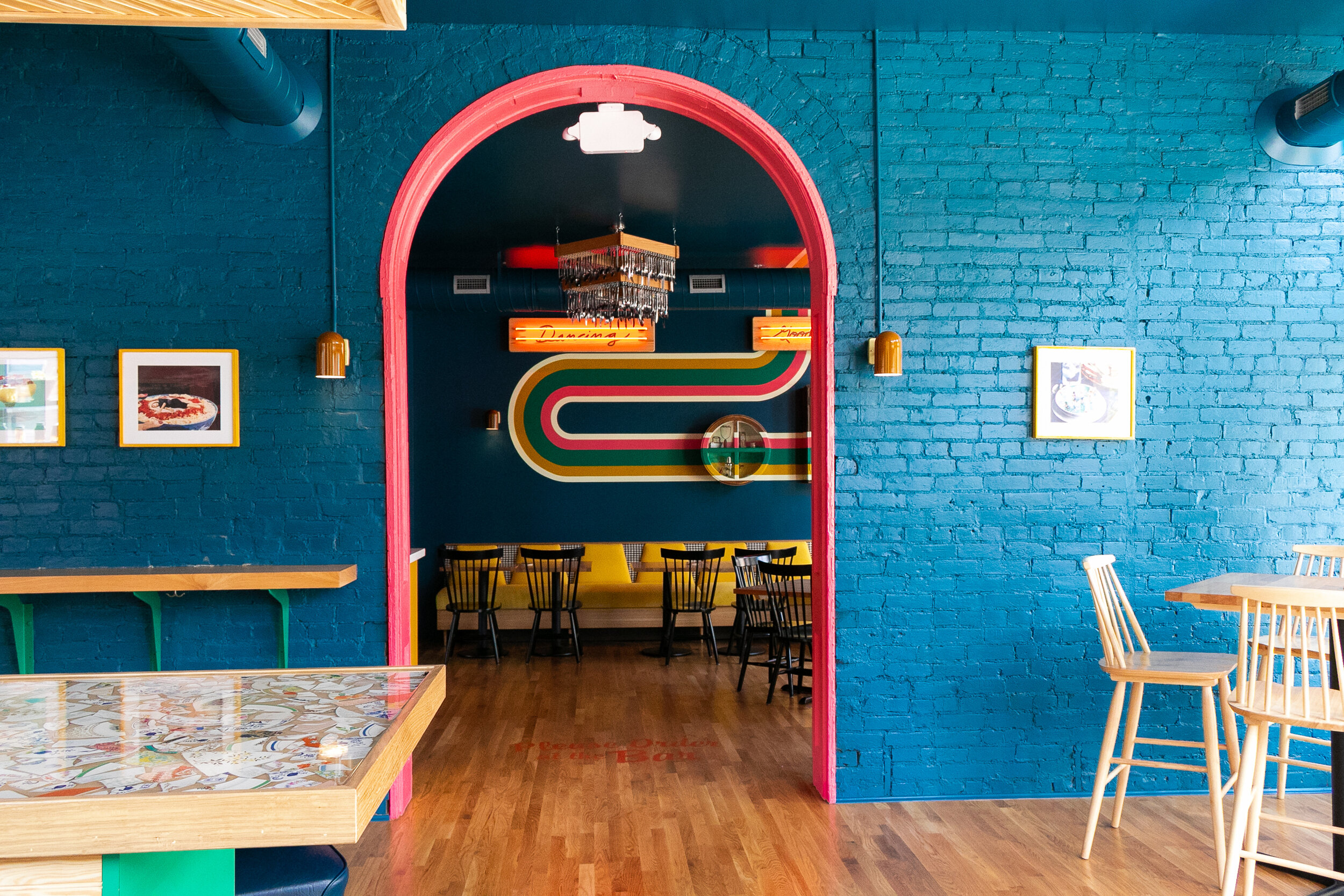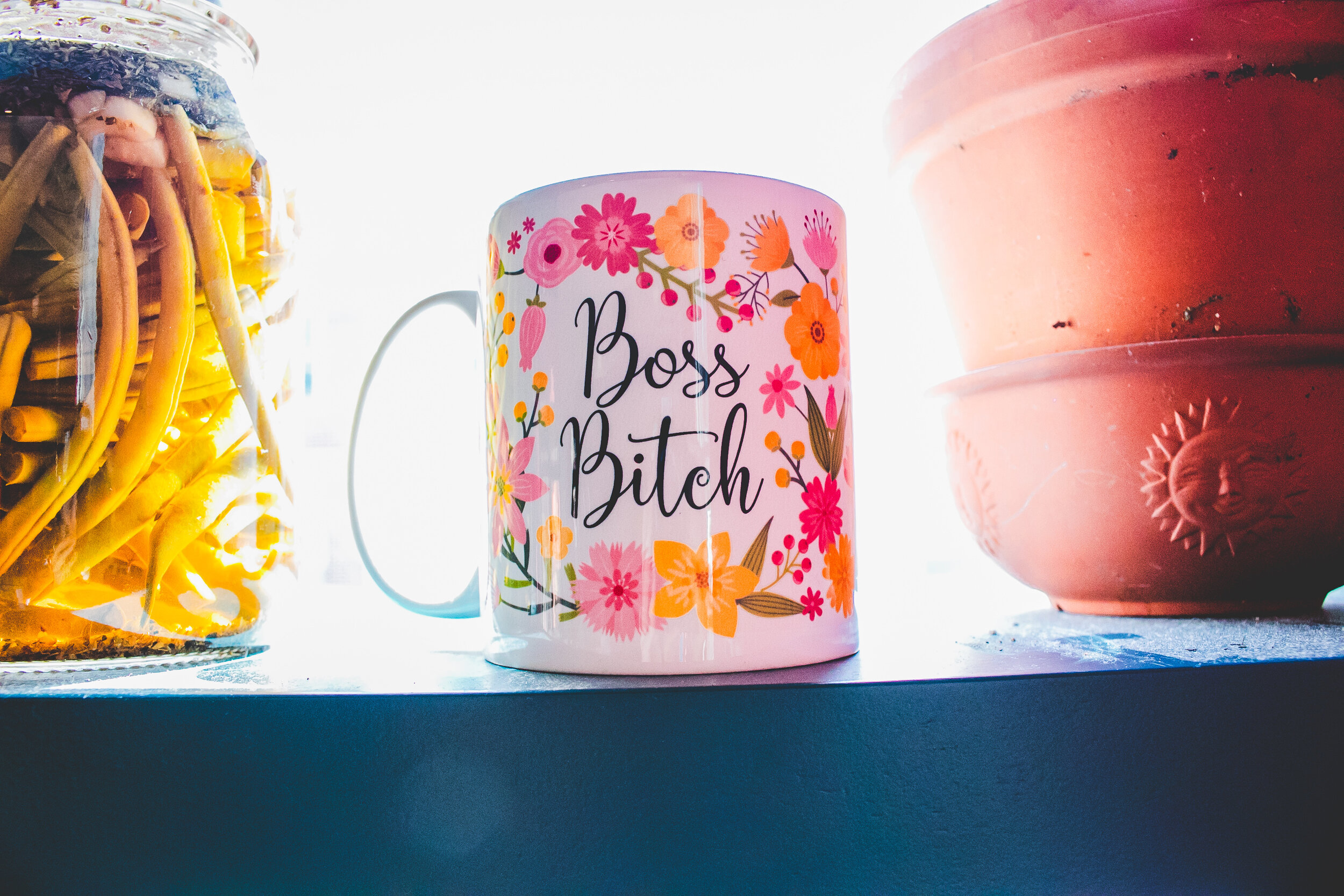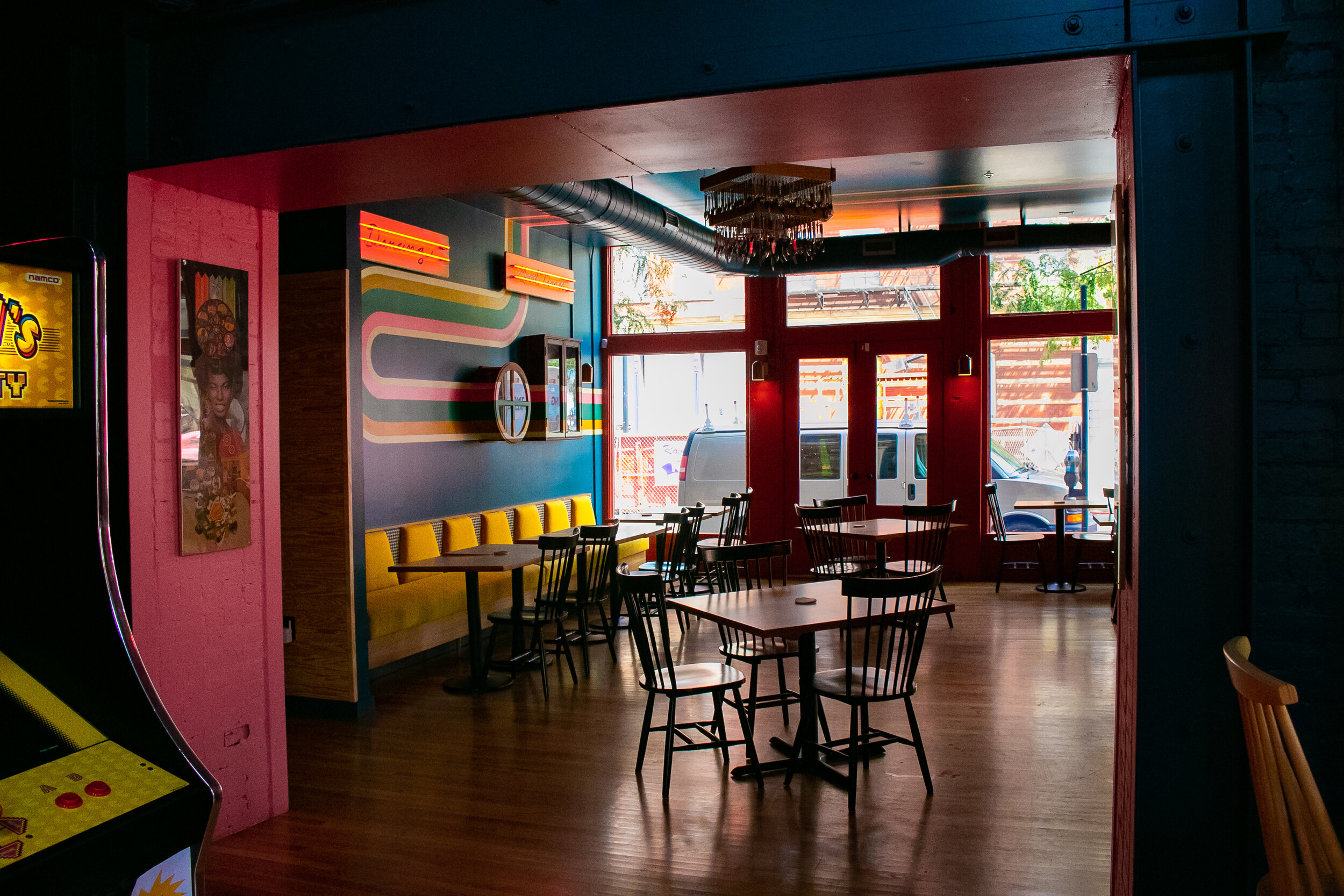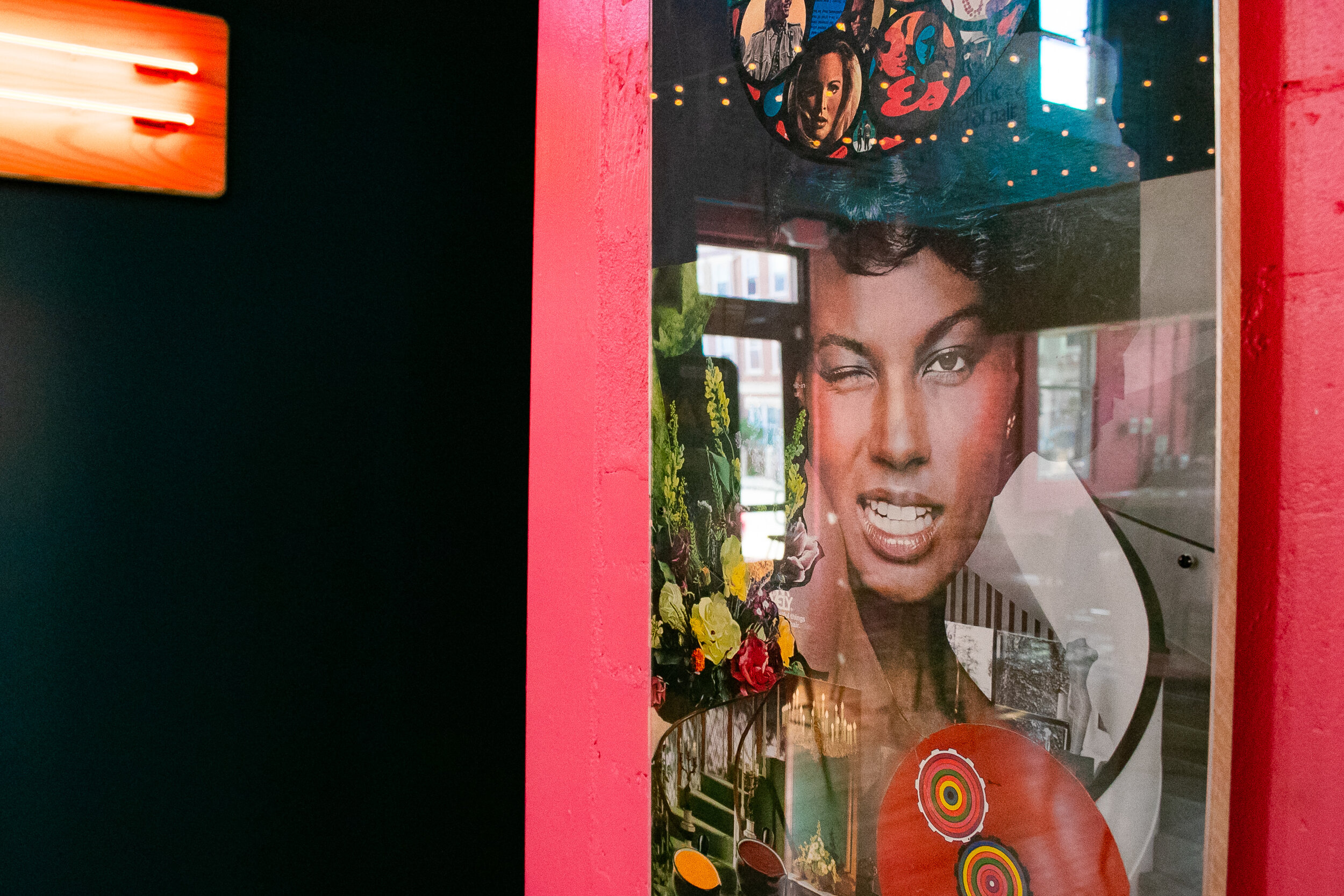This is Entrepreneurship: Catherine Manabat and Julia Petiprin of Homemaker’s Bar
Neon lights. Bright stripes. Smashed fine china. Every detail of Homemaker’s Bar draws you in and tells a story. We sat down with co-owners Catherine Manabat and Julia Petiprin approximately one month after the bar’s opening to chat about what it’s like to be a woman in the hospitality industry, the highs and lows of entrepreneurship, and how two L.A. ladies ended up falling in love with Cincinnati.
Entrepreneurship journeys look different for everyone, but one thing is certain: When it comes to making something out of nothing, the journey IS the job. To kick off our year-long series sponsored by Main Street Ventures, we dove into the journeys behind five woman-owned Cincinnati businesses.
Interview by Gina Regan. Photography by Chelsie Walter.
Note that this interview contains some strong language.
Tell me about yourselves.
Catherine Manabat: I grew up in Los Angeles and moved here because of a quarter-life crisis. I had a different career: I went to film school. You get to this point where you're like, “I don't want this life.” I needed to remind myself who I was again, and the act of physically moving myself to another place seemed like the most logical thing to do.
Cincinnati was not where I wanted to end up, but my best friend is from here. I didn't have a job or a place to live, so naturally my best friend was like, "Cool, you should come hang out with me for a bit" – being a supportive friend, which is amazing, but also being like, "Uh, I think maybe you've lost your mind a little bit." I was just going to be here for a month, and then it turned into six months. Then I was here for a year and I fell in love with Cincinnati and I never left.
Cincinnati is just like any other town. There are problems, but I feel like it's really easy to build community. That's always been such a big part of what makes me happy as a person: that sense of community and feeling like your voice has an impact. So I stayed, and I was bartending to figure out what I was going to do.
I ended up at 21c and really fell in love with this thing that I had been doing as a side gig. It opened up something inside of me that was like, "Wow. I really love this." The people there gave me so much freedom to do and think of anything that I wanted to, and that freedom is so empowering. It makes you feel so invested with that place and what you're creating there. Being part of the opening team was definitely a pivot point for me as far as really hunkering down in the industry and realizing, “This is what I want to do. This is what makes me happy.”
I left there to work for Watershed Distillery, and Watershed led me to Julia! It's cool that we met on a professional level and built that respect, and then both of us being from L.A, I think we kind of had that in common, and there were so many other things that clicked for us, and we became friends.
I was never like, “Top 10 things I want to do in my life: open a bar.” But it seemed it would be silly to say no to this opportunity to be able to work with someone like Julia. It seemed like, “No, this is exactly what I should be doing, and exactly what I want to do.” I think that's a big part of it: listening to when your plans change, and being open to that possibility and that journey.
Julia Petiprin: I'm from Michigan, originally, and grew up right outside of Flint, and I was like, “What the hell am I going to do in Flint, Michigan?” I've been in this business for a long time – just like Catherine – but I started as a busser/host and worked at Chili's, which is so Midwest. I also worked at this German place and wore this stupid little hat and the whole German get-up. It was bright blue, and the cap was red with a feather. This was a means to an end for me, but then I made my way into bartending at a bar and grill, and that's where I found a sense of community. It was such a tight-knit team. They taught me really young that you're in charge and you have to own your space.
Then I was like, "What the hell am I doing? Just working at this bar." I started college there. I was going for theatre, but wasn't even a theatre kid. I was never in theatre in high school [laughs], so I was like, “What the hell am I doing? This is so dumb. I'm wasting my money.” I met a friend who was leaving to go to L.A., and I hopped in the car and drove to Los Angeles, and was like, "Well, I’ll see what happens here!" I started bartending out there at every different kind of place: hotels, bar and grills, you name it. I was kind of hanging out, but I figured I should probably go back to school and apply myself. I graduated with my degree in interior design and was still bartending full-time.
We're deciding what we want the word “homemaker” to be.
–Julia Petiprin
Towards the end of my school life, I had this crazy idea of, "I can design bars that I'm going to own," and so I started my design firm out in L.A. part-time while I was bartending. I got a couple small jobs – some residential stuff – and I did some stuff for bars that I had worked at. Then the opportunity presented itself to design a full-scale bar – my own project. We looked at a bunch of different spaces. Nothing was hitting, and they were kind of losing steam, and it was so expensive, and they were like, "The risk is so high.”
Then one guy was like, "Well, before we call the whole project, I have this idea, but it would be in Cincinnati, Ohio."
Me and the operator at the time were like, "Sure. We'll go check out Cincinnati. Why not?" We flew to Cincinnati and drove around the whole O.T.R. area, and it was amazing. The architecture is insane. It seemed like a really cool neighborhood that was on the rise.
So we pitched [Sundry & Vice] to 3C.D.C., and they liked the concept, so we flew back and a month later they called us and were like, "Let's do it!"
We started to plan, and I was just the designer, and then the operator was like, “Wait, I would have to move to Cincinnati to do this, so I'm out."
I said, "I'll do it! I have all this experience." I thought I’d move to Cincinnati for a year, design the place, help get it open. It would be great on my resume. Then I moved to Cincinnati and… I fell in love with Cincinnati [laughs].
Homemaker’s Bar was sort of the next step. I met Catherine probably the first year that [Sundry & Vice] opened. She was a badass, and we totally vibed, and I saw that we aligned on a lot of things, so I started planting seeds. I had this idea that I wanted to open a boutique liquor store or something like that around here, so I thought she'd be perfect with all her experience doing cocktail classes and events. That's how I hooked her first, and it eventually turned into this.
You’ve both mentioned this sense of community that you found in Cincinnati that led you to stay here, as well as your work building community among local bartenders. What do you want Homemaker’s Bar to contribute to this community?
Catherine: I think this idea of celebrating makers and people who make something of themselves in a city like Cincinnati is really important because there are so many resources for people who want to be entrepreneurs in this city. There are so many people who celebrate entrepreneurs. One of the intentions of this space is to collaborate with other makers in our community. Sometimes it's an awareness thing: “Hey, did you know that there are People's Liberty and Mortar and all these amazing things for you to be able to make this thing that you have envisioned?” It's never easy, but it's easier in a space like Cincinnati that's so tight-knit, where people are so welcoming and rooting for you. In that context, Homemaker’s, I think, is a good space where people can meet. Not just being a “neighborhood bar,” but a community bar where people can feel that sense of community.
Homemaker’s Bar seems like it's a play on the 1950s/’60s housewives that you’re putting a completely new twist on. Is there any sort of intentional subversion of this homemaker stereotype?
Julia: Yeah, you nailed it. While we do pay homage to that era and to the traditional homemakers – Catherine's mom was and is a homemaker – it's also like, “Well, we don't have to be that.” It’s a little bit rebellious, a little bit of, "We're deciding what we want the word ‘homemaker’ to be." We're two women opening a bar. We want to have children. We're still homemakers, you know? In my brain, I take it even further. A man can be a homemaker. There are stay-at-home dads, as well, so forget this idea you have of the word. Let's remake this word. Let's re-decide what we want this word to mean, and share it with a lot more people.
Catherine: That's exactly it. Part of our cornerstone as "homemakers" is we defy convention. That just means you have a choice. That rebelliousness and that idea of “You can be whoever you want” is really meaningful because – for women, especially – I think the biggest thing is you're not less of a woman if you decide not to stay at home and have kids by the time you're X years old. Or you're not less of a woman if you do. Nobody decides for us anymore. We decide for ourselves who we want to be.
There are some preconceived notions about the restaurant industry being a boys’ club. Have you had that experience? Has it been more difficult being in this space as a woman?
Julia: Short answer: yes. I have three older brothers, so I'm used to the boys’ club, but it really is. I don't think as much anymore, and actually in Cincinnati, specifically, there are so many badass women owning this industry, but behind the bar has always been a little misogynistic. You don't necessarily realize it until later on, and you're like, "Oh yeah, that shouldn't happen." It's changed a lot. A lot. But there are still those challenges. Opening a bar is hard by itself, when you're looking for partners or you're trying to raise money. People see bars as risky because there are so many people who open a bar who don't really know what they're doing, or who think it's all one big party. That's already a challenge, but then being a woman – and then being two women – was especially challenging when we were trying to raise money because people were like, "Oh, so you're going to fight.”
Catherine: "What if you have a disagreement?"
Julia: “Two women, I don't see that working out.”
And you're like, "What? Is there a reason behind that?"
It’s interesting to me that you say you're lucky to be surrounded by people in the community, but it seems you are really creators of community. You talked about this group of awesome women in the hospitality industry. You realize that you two are a big part of that, right?
Julia: What? [Laughs.] No, I just go hang out places.
Catherine: I don't know. I think it's funny because we both aren't from here, and we choose to live here. It's not because I'm like, "Oh, man. I'm in Cincinnati. Might as well make the best of it." From an outside perspective, we see something special here and you want to share and celebrate that, and all of the people who have opened businesses in Cincinnati who are so successful like Molly [Wellmann] and Thunderdome and 4E.G… all of these people who are doing things and you see how special it is and you want other people to see it, too.
Working at 21c, people would stay there from London, New York, and Paris, and they were always like, "Oh my god, Cincinnati is kiiiinda nice!"
Always so shocked, and I was like, "No, it's amazing. Tell your friends." So you feel like you're part of it in that way.
Trusting your gut is a big thing.
–Catherine Manabat
Julia: When I moved here, which was four-and-a-half years ago now, and I opened Sundry & Vice, I didn't know anybody. I’ve always made friends in bars. I've just worked in bars, and people who usually like hanging out in bars are open to meeting new people and creating their own communities, so I started hanging out at Liberty Bar & Bottle a lot. I became friends with the owners there and some of the bartenders. That was the beginning of me getting to know people in this industry in the neighborhood. Then, when I met Catherine, that really opened up the community here. It seemed very competitive to me. Everyone was coming in trying to stump the bartender and sizing us up, and it was like, "What is going on?! This is crazy. We all do the same thing. Let's be friends."
Do you consider yourselves entrepreneurs?
Catherine: Yeah. It's weird to say that out loud about yourself, but then you realize that's exactly what we're doing. An entrepreneur is someone who works really hard. I think I work hard. Julia works so hard. You couldn't do this with someone who didn't work as hard, if not harder, than you. So that word, to me, means someone who's going to put it all out there. There's no glamour behind it, no sense of, "Oh, I'm a fancy entrepreneur! I sit around and drink vermouth all day.” No. You work hard. You do what needs to be done.
I think it's hard because there's another attachment to that word that I don't associate with: the social media vibe of "I'm an entrepreneur," said in a way that means you're only getting the good part of it, you know? I think another cool thing about a place like Cincinnati is that all of the entrepreneurs we surround ourselves with are so willing to share not only their good stories and successes, but also their mistakes. That is so important in cultivating a supportive community because in a place like L.A., it's so braggadocious: "We're crushing it, blah blah blah. No problems here! I didn't have to clean up puke last night." Here, people are so real.
When you start a business, knowing how hard it is doesn't make it easier. Someone said that to me the other day: "Did you think it was going to be this hard?" Absolutely. That doesn't make me less tired. What you don't know is how good it feels, because you don't know that until you're there, and that's the part that keeps you going. We were joking the first two weeks that we were running on sheer adrenaline, caffeine, and breakfast food because that's the only time we had time to eat. That's it. You're just going. It's pretty surreal.
Julia: It is surreal, but then things start to fall into place, and systems start to happen, and bartenders get comfortable, and it's like a beautiful dance. And that's the moment you realize, "We opened a bar. Holy fuck! It's working! We did it!” [Laughs.]
Is there anything that you would want to share with somebody who is reading this and is thinking about taking a leap into an entrepreneurial endeavor?
Julia: The raising money portion was hard. But also exhilarating. I was probably the most stressed I've ever been. I had a really aggressive deadline. It was something I'd never experienced before.
Talk to people. Talk to anybody. Ask anybody anything. If you meet somebody at a bar, find out what they do and ask them for tips. It's important to talk to people who are different than you and come from different backgrounds. Expanding my circle was the thing that really gave me the ability to be able to do this. A friend of a friend whose boyfriend happens to be an investment guy but lives in San Francisco will reach out to you and say, "Give me a call if you have any questions." Actually call those people.
The end goal is never worth you giving up the things that are important to you.
–Catherine Manabat
A lot of people would be like, “He was really nice and said I could call him, but he probably didn't mean it.” Don't doubt it. Call these people. They will help you and get you to where you need to go.
Catherine: Trusting your gut is a big thing, and believing. Whatever business someone tries to open, you have to believe that you can get there. Don’t make sacrifices where you're giving away parts of your business. The end goal is never worth you giving up the things that are important to you. Have boundaries and set expectations with anyone who comes into that space: If you believe in us, cool. If not, no big deal. Trusting your instinct is really important. That intuition thing, man. It's real.
Does any time come to mind when you made a mistake or when you felt like, "What am I doing?" or weren't sure that this was going to happen?
Julia: For me, it comes back to raising the money. Everybody was like, "We're going to give you the money! I'll promise you X amount of dollars.”
You're like, “This is going to be so easy.” You go through the process, and Catherine and I put together what we thought was a decent business plan, and I took it those people, and they were like, “Oh, well, maybe I'll actually give you this much money,” and some of them bailed completely.
We had this deadline, and it was like, "Oh shit." So we went back to the drawing board. We spent more money and came up with this hardcore packet that was super detailed.
It was a huge learning moment. Luckily, one of those people was like, “Well, I don't see this, this, or this.” Someone was kind enough to tell us that it wasn’t a complete package. We went back to the drawing board again. We had to start from ground zero and find new people with this new packet that took us a long time to do. It was really dark. I think the mistake was that we needed to start correctly from the beginning and really do our research to figure out what we needed to show these people.
A lot of this love for the homemaker and things like that come from my family, but also women who can overcome and do things that people said were impossible.
–Julia Petiprin
Catherine: Part of it was that we wanted to tell a story. We thought the intention behind the business was what was going to get us there. Whereas a lot of people we were meeting with only wanted to know numbers. They didn't necessarily care about the story at all. It was secondary for most of them. In that sense, adjusting your lens of presenting in the context of business…. It's really important to have that backbone for yourself, but not necessarily for investors. That was a big learning experience.
Tell me about an influential woman in each of your lives.
Catherine: I'll try not to cry, but my mom. Always my mom. She raised seven kids. She's incredibly passionate; loves so much. She's such a big-hearted woman and the sacrifices she's made in her life for her children – I can't fathom that kind of selflessness. I am going to cry [tears up and laughs]. It happens every time! I aspire to be the kind of human that she is. She's very non-traditional for a Filipino woman in that she never asked us to be anything other than ourselves. Our happiness, living a life that was fulfilling, was so important to her. Having that choice of being whatever kind of woman I wanted to be and having that support, I feel so lucky. Having that support has really allowed me the luxury of being able to make such seemingly impulsive choices in the moment because I've always had that. Everything I do is to hear my mom say, "I'm proud of you." Her success is directly tied to the happiness of the people she loves, and that's such a selfless way to exist and love. I try to do it, but it's incredibly hard to do that all of the time. She's a badass. There are five girls in my family, two boys. She's raising very strong women. She said, "You will always have your family, but you will have to be able to take care of yourself and never depend on anyone."
Julia: For me, I have to say that it's not just one woman. My mom is the strongest woman I know. The strongest woman I know. She's had a crazy life, and I'm really empowered by her strength, and she will give anything to her children. She won't be able to pay her bills, but her kids will be fine, you know?
But I've always found in my life that my hero growing up was Amelia Earhart. I know it's so weird and nerdy, but I've always kind of found these other really strong women that found a thing and did it. She was the first woman pilot. To me, that was so crazy cool.
And my grandma was always there for me and taught me a lot of things. A lot of this love for the homemaker and things like that come from my family, but also women who can overcome and do things that people said were impossible.
Catherine: Just a side note, Julia's mom was here helping us in the last days of the opening. I mean, she painted those stripes on the curio cabinets.
Julia: Yeah, she’ll do anything. She built me a deck. I mean it's not a good deck [laughs], but she did it. And she built me, God love her, like, the worst porch railing. It's still there. She's the hardest worker. She's so creative. She doesn't stop.
Catherine: The day we opened, she was here before either of us. I was like, "You clocking in early, Sally? You working on overtime? How did you beat me here?!" [Laughs.] I think it's important to be around other women who work harder, because it drives you. I definitely think Julia and I drive each other, because she works so fucking hard. It's crazy.
Julia: You work just as hard!
Catherine: I know! It's good to have that person to drive you.
There is no single definition of an entrepreneur. Check out our year-long series, "This Is Entrepreneurship." Sponsored by Main Street Ventures.



